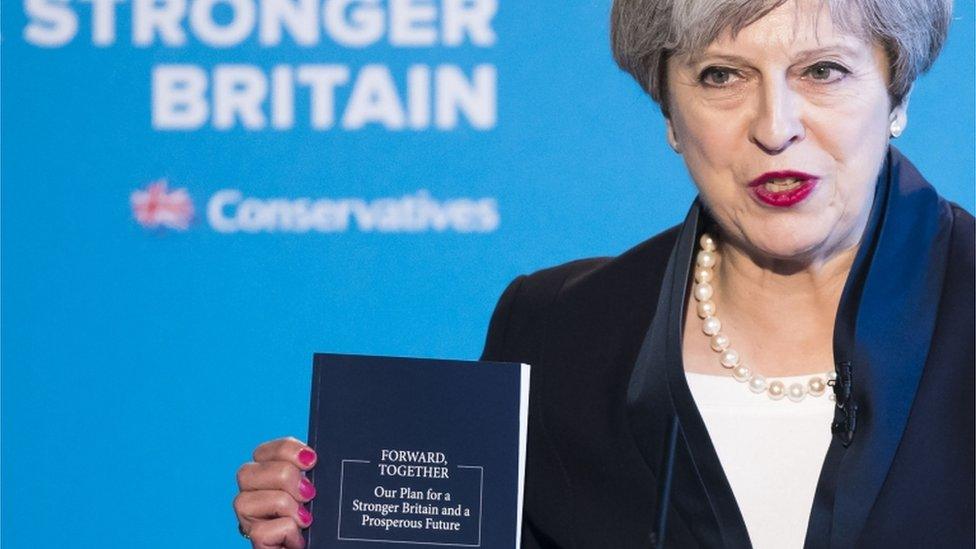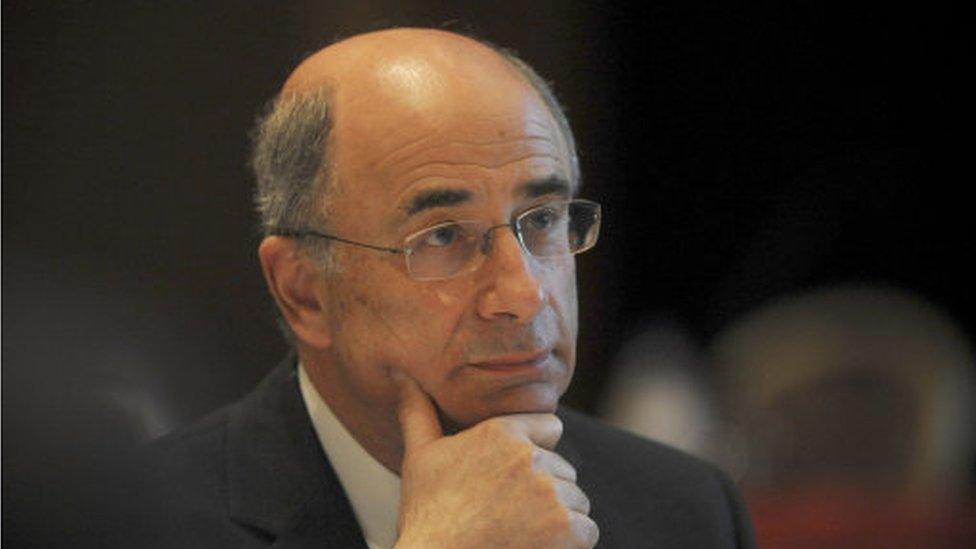May delights her fans in the press
- Published
So it turns out that a prime minister's word isn't always sacrosanct - because, after all, he or she won't be in No 10 forever.
Victims of press abuse in Britain believe they were given a cast-iron guarantee that the second stage of the Leveson Inquiry, which would look at corporate governance at Rupert Murdoch's News International as well as the relationship between Britain's press and the police, would definitely go ahead.
The Tory manifesto says that, if they are elected, it will not.
Moreover, Section 40 of the Crime and Courts Act 2013, which if enacted would have forced newspapers to pay the costs of legal action taken against them - unless they belonged to an approved regulator - has also been dropped.

Theresa May has held private meetings with senior figures in the press.
The big newspaper groups in Britain - such as those that control the Daily Mail, the Times, the Daily Telegraph and the Daily Express - can hardly believe their luck. Not only have they got a Conservative prime minister who, in their view, is certain to get a big majority on 8 June, but now she has relieved them of two of the biggest threats looming on their horizon.
You can bet your bottom penny that Friday's editorials will be gushing in their praise for this decision. I can almost see them now. "With this bold, brave decision, Theresa May is the first prime minister in years to show her deep commitment to a truly free press…" And so on.
Victims' groups are already complaining that this is a "stitch-up".
They say the extensive contact between Mrs May and leading editors and proprietors shows that, after their extensive lobbying effort against Leveson 2 and Section 40, she has delivered what they want in return for the gushing news and opinion coverage of recent weeks.
It is true that no prime minister since Margaret Thatcher - not even Tony Blair in his pomp - has had such approval from Britain's newspapers as Mrs May; and, moreover, it is obviously the case that Leveson 2 and Section 40 were discussed at length in those private meetings between the prime minister and senior figures in the press.
But it is worth saying that, long before they ascended to power, senior figures in No 10 were profoundly sceptical toward both Leveson 2 and Section 40.
And given Jeremy Corbyn is unashamedly socialist, and David Cameron was considered an effete and inconsequential conservative by some very powerful figures in the press, it was always inevitable that Mrs May would find it easy to persuade Britain's right-leaning papers to endorse her programme.

The Conservative manifesto has scrapped plans for the second part of Lord Leveson's inquiry
Still, we should be in no doubt about the significance of Thursday's revelation that the second stage of Leveson will be dropped.
It shows how, years after the phone-hacking scandal that led to the first stage of the inquiry, the political mood music has changed, and Britain's newspapers have not been brought to heel as their detractors wanted.
Occasionally, when scandal erupts, the British public indulge themselves with a hysterical but hollow hatred of the press, only to continue buying the newspapers they pretend to admonish.
For a while after the death of Diana Spencer, there was public outcry about the predatory behave of paparazzi. Millions of copies of OK! and Hello! later, and with Mail Online's sidebar of shame reaching record numbers, the paparazzi are doing just fine, thank you very much.
Similarly, when the phone-hacking scandal dominated headlines years ago, public sympathy with victims of press abuse forced politicians to respond - which they did, with the Leveson Inquiry.
But as the phone-hacking scandal recedes from memory, and as Leveson's recommendations for an approved press regulator are completely ignored by many of Britain's most powerful newspapers, Thursday's announcements on the second stage of that inquiry, and also on Section 40, show newspapers in this country still wield huge power.
Sure, circulation and advertising revenue is down; but for all that, tomorrow's editorials will celebrate a prime minister who has answered their most desperate pleas, and emphatically too.